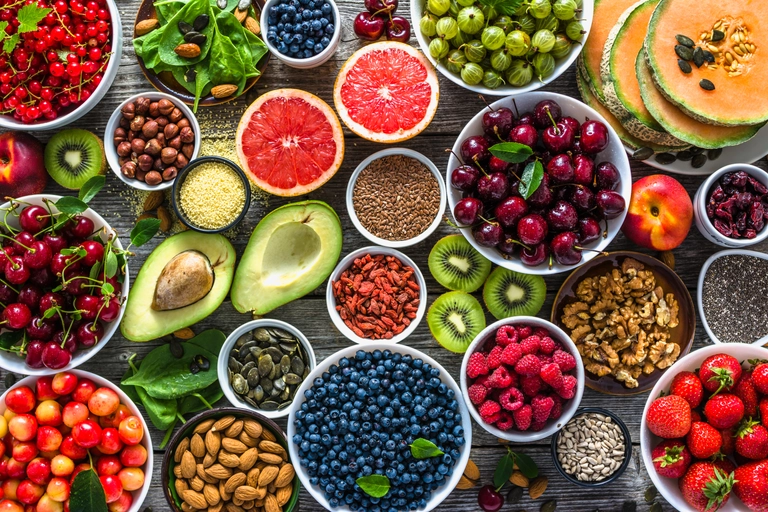
What are Superfoods?
Superfoods are nutrient-dense foods that are packed with vitamins, minerals, antioxidants, and other compounds that contribute significantly to overall health. Though there is no legal or medical definition for “superfoods,” the term generally refers to foods that provide maximum nutritional benefits with minimal calories. They are often high in antioxidants, which help fight free radicals and reduce oxidative stress, promoting better cellular function and potentially lowering the risk of chronic diseases like heart disease, cancer, and diabetes.
The idea behind superfoods is that they deliver an exceptional range of nutrients in their natural form, making them ideal for supporting the body’s functions, boosting immunity, and maintaining overall wellness. Incorporating a variety of these foods into a balanced diet can provide multiple health benefits and even help to prevent certain health conditions.
Types of Superfoods
Superfoods can be categorized into several groups based on the type of nutrients they provide or their biological function in the body:
1. Fruits
Fruits are known for their high content of vitamins, especially vitamins C and A, fiber, and antioxidants. Many fruits are also rich in phytochemicals, which have been linked to cancer prevention and heart health. Examples of fruit superfoods include:
- Blueberries: These are rich in antioxidants, particularly anthocyanins, which promote brain health and reduce inflammation.
- Acai Berries: High in antioxidants, fiber, and heart-healthy fats, they support immune function and skin health.
- Pomegranates: Loaded with vitamin C, polyphenols, and flavonoids, they help lower blood pressure and support cardiovascular health.
2. Vegetables
Vegetables are full of essential vitamins, minerals, fiber, and antioxidants. Leafy greens, cruciferous vegetables, and root vegetables are particularly noted for their superfood qualities.
- Kale: This leafy green is high in vitamins A, K, and C, calcium, and powerful antioxidants.
- Spinach: Rich in iron and folate, spinach is beneficial for red blood cell production and overall energy levels.
- Broccoli: Known for its cancer-fighting properties, broccoli is high in vitamins C and K and contains sulforaphane, a compound linked to reduced cancer risk.
3. Nuts and Seeds
Nuts and seeds are excellent sources of healthy fats, protein, fiber, and micronutrients like magnesium, zinc, and vitamin E. They support heart health, brain function, and overall energy levels.
- Chia Seeds: High in omega-3 fatty acids, fiber, and protein, chia seeds support digestive health and help in maintaining energy levels.
- Almonds: Rich in healthy fats, protein, fiber, and antioxidants, almonds contribute to heart and brain health.
- Flaxseeds: These seeds are a great source of lignans, which have antioxidant properties, and omega-3 fatty acids that support heart and brain function.
4. Whole Grains
Whole grains are packed with fiber, vitamins, and minerals and play a vital role in maintaining digestive health, regulating blood sugar, and providing sustained energy.
- Quinoa: A complete protein, quinoa contains all nine essential amino acids, making it a powerhouse of nutrition, especially for those on plant-based diets.
- Oats: Rich in fiber and antioxidants, oats can help reduce cholesterol and stabilize blood sugar levels.
5. Fish and Lean Proteins
Cold-water fish, like salmon, are considered superfoods due to their high omega-3 content, which supports brain health, reduces inflammation, and promotes heart health.
- Salmon: Loaded with omega-3 fatty acids, protein, and vitamin D, salmon supports heart and brain health.
- Sardines: High in protein, omega-3s, and vitamin B12, sardines are a nutrient-dense food that benefits cardiovascular and cognitive functions.
6. Herbs and Spices
Herbs and spices are often overlooked but can be some of the most concentrated sources of antioxidants and anti-inflammatory compounds.
- Turmeric: Contains curcumin, which has powerful anti-inflammatory and antioxidant effects, and supports joint health and brain function.
- Ginger: Known for its ability to ease digestion, reduce nausea, and fight inflammation, ginger is widely used for gastrointestinal health.
7. Beverages
Certain beverages, especially those derived from plant sources, are rich in antioxidants and beneficial compounds that support various aspects of health.
- Green Tea: Loaded with catechins, green tea is an antioxidant powerhouse that promotes fat burning and improves brain function.
- Matcha: A concentrated form of green tea, matcha provides even more antioxidants and is believed to boost metabolism and enhance mood.
Explore Common Superfoods
- Almonds – High in healthy fats, fiber, protein, and magnesium.
- Avocados – High in heart-healthy monounsaturated fats and potassium.
- Beets – Good for heart health and blood pressure regulation.
- Blueberries – Rich in antioxidants, particularly vitamin C and vitamin K.
- Broccoli – Rich in fiber, vitamins C and K, and anti-inflammatory compounds.
- Cacao – High in antioxidants, magnesium, and iron.
- Chia Seeds – Packed with fiber, omega-3 fatty acids, and protein.
- Dates – Powerhouse of nutrients, offering an impressive array of vitamins, minerals, and macronutrients.
- Eggs – Powerhouse of nutrition widely celebrated as a superfood due to their high-quality protein, essential vitamins, minerals, and healthy fats.
- Flaxseeds – Rich in omega-3 fatty acids, fiber, and lignans.
- Garlic – Known for its immune-boosting and anti-inflammatory properties.
- Ginger – Aids digestion and reduces inflammation.
- Goji Berries – High in antioxidants, vitamins A and C, and fiber.
- Green Tea – Loaded with antioxidants, particularly catechins.
- Honey: Offers a range of health benefits due to its unique composition of natural sugars, antioxidants, enzymes, and other bioactive compounds.
- Kale – High in vitamins A, K, and C, as well as calcium and fiber.
- Pumpkin Seeds – Packed with magnesium, iron, and antioxidants.
- Quinoa – A complete protein containing all nine essential amino acids.
- Salmon – A great source of omega-3 fatty acids, which support heart health.
- Spinach – Rich in iron, calcium, and vitamins A and C.
- Sweet Potatoes – Loaded with beta-carotene and fiber.
- Turmeric – Contains curcumin, a potent anti-inflammatory compound.
- Walnuts – Excellent source of omega-3 fats, antioxidants, and protein.
